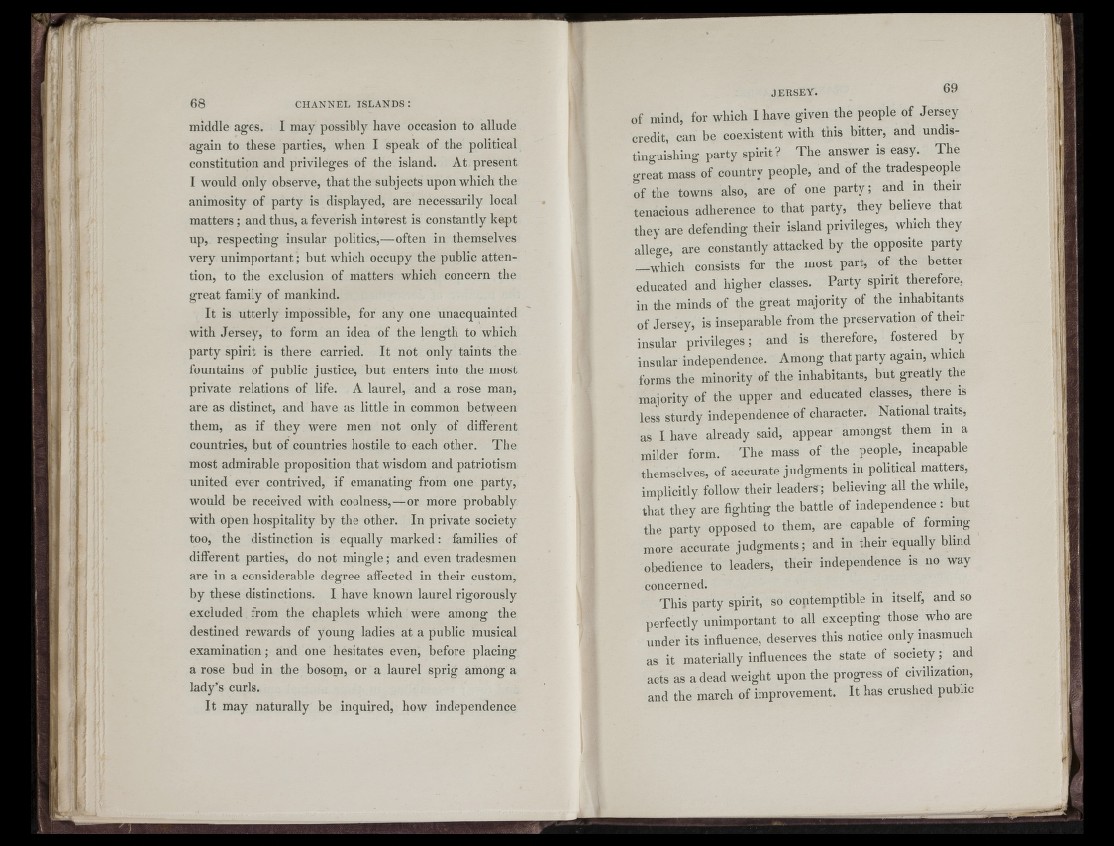
[ i
middle ages. 1 may possibly have occasion to allude
again to these parties, when I speak of the political
constitution and privileges of the island. At present
I would only observe, that the subjects upon which the
animosity of party is displayed, are necessarily local
matters; and thus, a feverish interest is constantly kept
up, respecting insular politics,—often in themselves
very unimportant; but which occupy the public attention,
to the exclusion of matters which concern the
great family of mankind.
It is utterly impossible, for any one unacquainted
with Jersey, to form an idea of the length to which
party spirit is there carried. It not only taints the
fountains of public justice, but enters into the most
private relations of life. A laurel, and a rose man,
are as distinct, and have as little in common between
them, as if they were men not only of different
countries, but of countries hostile to each other. The
most admirable proposition that wisdom and patriotism
united ever contrived, if emanating from one party,
would be received with coolness,—or more probably
with open hospitality by the other. In private society
too, the distinction is equally marked: families of
different parties, do not mingle; and even tradesmen
are in a considerable degree affected in their custom,
by these distinctions. I have known laurel rigorously
excluded from the chaplets which were among the
destined rewards of young ladies at a public musical
examination; and one hesitates even, before placing
a rose bud in the bosom, or a laurel sprig among a
lady’s curls.
It may naturally be inquired, how independence
of mind, for which I have given the people of Jersey
credit, can be coexistent with this bitter, and undistinguishing
party spirit? The answer is easy. The
great mass of country people, and of the tradespeople
of the towns also, are of one party; and in their
tenacious adherence to that party, they believe that
they are defending their island privileges, which they
allege, are constantly attacked by the opposite party
-vvhich consists for the most part, of the better
educated and higher classes. Party spirit^ therefore,
in the minds of the great majority of the inhabitant
of Jersey, is inseparable from the preservation of their
insular privileges; and is therefore, fostered by
insular independence. Among that party again, which
forms the minority of the inhabitants, but greatly the
majority of the upper and educated classes, there is
less sturdy independence of character. National traits,
as I have already said, appear amongst them in a
milder form. The mass of the people, incapable
themselves, of accurate judgments in political matters,
implicitly follow their leaders; believing all the while,
that they are fighting the battle of independence : but
the party opposed to them, are capable of forming
more accurate judgments; and in their equally blind
obedience to leaders, their independence is no way
concerned.
This party spirit, so contemptible in itself, and so
perfectly unimportant to all excepting those who are
under its influence, deserves this notice only inasmuch
as it materially influences the state of society; and
acts as a dead weight upon the progress of civilization,
and the march of improvement. It has crushed public
r ” I
i